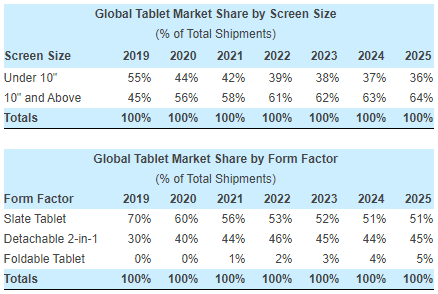Strategy Analytics released the latest report for the tablet PC market. The research firm said that online education has promoted the demand for larger screen tablets. At the same time, the global tablet PC sales have increased for the first time since 2014.
Also Read: China’s Tablet Pc Market Report For The First Quarter Of 2020
Due to the impact of the new coronavirus epidemic, people's work, study and entertainment are carried out at home. So electronic devices at home have become extremely popular. Consumers are buying tablets at the fastest rate in six years. By 2020, global tablet PC sales are expected to increase by 1% year-on-year reaching to 160.8 million units. The analysis also shows that consumers are shifting to larger screen sizes. Most tablet PCs (56%) with a screen size of 10 inches and larger have a high demand.

More and more tablets are used for productivity and education purposes. This also promotes detachable 2-in-1 devices (for example, Samsung’s Galaxy Tab S7, Microsoft’s Surface Pro 7, etc.). The report pointed out that tablet PC sales may remain stable in the next few years. But competition will become more intense with the emergence of alternatives to notebook computers.
Tablet PC Market Performance
Strategy Analytics said: ‘Productivity is a key driver in these trends. But let’s face it: quarantine is boring and streaming video is always better on a larger screen. Even low-cost entertainment slate tablets have caught a piece of the boom in tablet demand. Small sized tablet demand is declining as large smartphones/phablets continue to put pressure on small tablet demand. Accordingly, tablet vendors have focused their portfolios on the 10" to 13" segment and notebook sizing has moved to 13" and beyond for the most part. In addition to the shift toward larger screen sizes, detachable tablet shipments have more than doubled from 17% tablet market share in 2017 to 40% in 2020.’
Chirag Upadhyay, Senior Research Analyst said: ‘Notebook vendors are competing just as strongly for entertainment needs (like for gaming, or adding improved displays and audio) and have an advantage in the productivity category which has been built up over the last two years during the commercial PC refresh. Furthermore, economic stimulus during the pandemic may be driving artificially high demand and as reality sets in and in-person work and school become widely available once again, intense competition will result in more market consolidation. Over the long-term, this crash course in working from home will result in some portion of workers, students, and employers that will remain remote after the pandemic, sustaining a higher level of mobile computing demand than previously anticipated.’






Place comments
0 Comments
You are currently seeing only the comments you are notified about, if you want to see all comments from this post, click the button below.
Show all comments